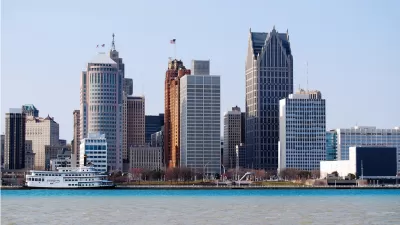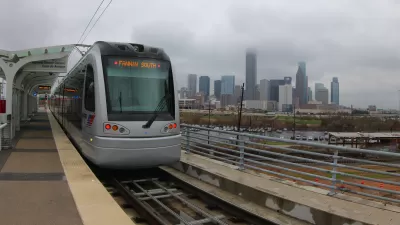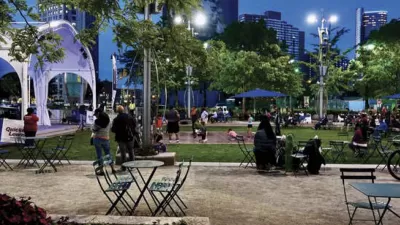Now is the time for cities to make strategic investments to scale up existing revitalization efforts.

"For 'legacy cities,' decades of economic decline have generally meant an array of ambitious revitalization plans are queued up but languishing, due to lack of funding and/or political will." Now, write Lavea Brachman and Eli Byerly-Duke, these cities have a chance to reinvigorate stagnant projects through federal funding from the American Rescue Plan (ARP). "Now is the moment for these cities to dust off their wish lists, activate their strategic playbooks to maximize the ARP funds, and line up implementation partners."
It has become clear that "the private sector alone cannot rescue these legacy places," but "the prospect of extensive public sector funds deployed alongside private sector investments and acting as a springboard for legacy cities and their regions is tantalizing." In cities that were already experiencing redevelopment before the COVID-19 pandemic, "local leaders can build on existing projects and initiatives" to regain momentum.
Meanwhile, "the opportunity to address equity issues in these cities and regions has never been greater." Targeted investments in low-income areas "can reinforce place-based initiatives already underway, such as East Side Avenues in Buffalo and the Strategic Neighborhood Fund in Detroit, catalyzed with state and local public investments and scaled with philanthropic funding." The authors highlight other examples of successful programs and projects in legacy cities that have made a positive impact and could be scaled up with increased funding and resources. "With the pie suddenly dramatically expanded, leaders can build on these pre-COVID projects by coalescing around priority-setting and sequencing of dollars deployed."
FULL STORY: Legacy cities can think big for transformative impact with ARP funds

Alabama: Trump Terminates Settlements for Black Communities Harmed By Raw Sewage
Trump deemed the landmark civil rights agreement “illegal DEI and environmental justice policy.”

Study: Maui’s Plan to Convert Vacation Rentals to Long-Term Housing Could Cause Nearly $1 Billion Economic Loss
The plan would reduce visitor accommodation by 25% resulting in 1,900 jobs lost.

Planetizen Federal Action Tracker
A weekly monitor of how Trump’s orders and actions are impacting planners and planning in America.

Waymo Gets Permission to Map SF’s Market Street
If allowed to operate on the traffic-restricted street, Waymo’s autonomous taxis would have a leg up over ride-hailing competitors — and counter the city’s efforts to grow bike and pedestrian on the thoroughfare.

Parklet Symposium Highlights the Success of Shared Spaces
Parklets got a boost during the Covid-19 pandemic, when the concept was translated to outdoor dining programs that offered restaurants a lifeline during the shutdown.

Federal Homelessness Agency Places Entire Staff on Leave
The U.S. Interagency Council on Homelessness is the only federal agency dedicated to preventing and ending homelessness.
Urban Design for Planners 1: Software Tools
This six-course series explores essential urban design concepts using open source software and equips planners with the tools they need to participate fully in the urban design process.
Planning for Universal Design
Learn the tools for implementing Universal Design in planning regulations.
Caltrans
Smith Gee Studio
Institute for Housing and Urban Development Studies (IHS)
City of Grandview
Harvard GSD Executive Education
Toledo-Lucas County Plan Commissions
Salt Lake City
NYU Wagner Graduate School of Public Service





























